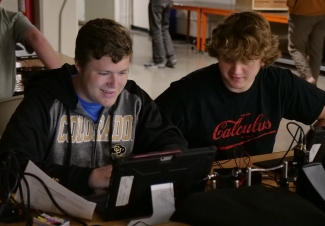Students' epistemological beliefs about physics (their beliefs about the nature of knowledge and what it means to know, learn, and do physics) can impact learning, interest, and experiences within the discipline of physics. As such, supporting students' epistemological development is a major area of research within physics education, including in laboratory environments. This can include students' general attitudes towards experimental physics, beliefs about how the process of experimental physics works, sense of agency and confidence to conduct experiments, and more.
We conduct research about students' attitudes and beliefs about experimental physics using the Colorado Learning Attitudes about Science Survey for Experimental Physics (E-CLASS), a broadly applicable assessment tool for undergraduate physics lab courses. The E-CLASS assesses students' views about their strategies, habits of mind, and attitudes when doing experiments in lab classes and can be used to investigate students' perceptions of the gap between classroom lab instruction and professional research.
Related to students' attitudes about experimental physics is whether they feel a sense of ownership over their project or experiment in a lab course or research experience. Ownership can include feeling responsible for, committed to, and personally connected to the project or experiment. Features of students' experiences that promote this are (i) interest, (ii) demonstrating agency, (iii) expressing positive affect, (iv) demonstrating a willingness to contend with challenges, and (v) working productively with others. We have conducted research to explore students' ownership in project-based lab courses.



 The Physics Frontiers Centers (PFC) program supports university-based centers and institutes where the collective efforts of a larger group of individuals can enable transformational advances in the most promising research areas. The program is designed to foster major breakthroughs at the intellectual frontiers of physics by providing needed resources such as combinations of talents, skills, disciplines, and/or specialized infrastructure, not usually available to individual investigators or small groups, in an environment in which the collective efforts of the larger group can be shown to be seminal to promoting significant progress in the science and the education of students. PFCs also include creative, substantive activities aimed at enhancing education, broadening participation of traditionally underrepresented groups, and outreach to the scientific community and general public.
The Physics Frontiers Centers (PFC) program supports university-based centers and institutes where the collective efforts of a larger group of individuals can enable transformational advances in the most promising research areas. The program is designed to foster major breakthroughs at the intellectual frontiers of physics by providing needed resources such as combinations of talents, skills, disciplines, and/or specialized infrastructure, not usually available to individual investigators or small groups, in an environment in which the collective efforts of the larger group can be shown to be seminal to promoting significant progress in the science and the education of students. PFCs also include creative, substantive activities aimed at enhancing education, broadening participation of traditionally underrepresented groups, and outreach to the scientific community and general public.